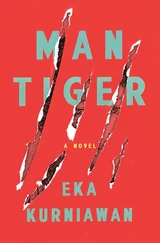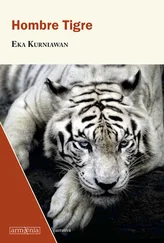Eka Kurniawan - Beauty is a Wound
Здесь есть возможность читать онлайн «Eka Kurniawan - Beauty is a Wound» весь текст электронной книги совершенно бесплатно (целиком полную версию без сокращений). В некоторых случаях можно слушать аудио, скачать через торрент в формате fb2 и присутствует краткое содержание. Год выпуска: 2015, Издательство: New Directions, Жанр: Современная проза, на английском языке. Описание произведения, (предисловие) а так же отзывы посетителей доступны на портале библиотеки ЛибКат.
- Название:Beauty is a Wound
- Автор:
- Издательство:New Directions
- Жанр:
- Год:2015
- ISBN:нет данных
- Рейтинг книги:5 / 5. Голосов: 1
-
Избранное:Добавить в избранное
- Отзывы:
-
Ваша оценка:
- 100
- 1
- 2
- 3
- 4
- 5
Beauty is a Wound: краткое содержание, описание и аннотация
Предлагаем к чтению аннотацию, описание, краткое содержание или предисловие (зависит от того, что написал сам автор книги «Beauty is a Wound»). Если вы не нашли необходимую информацию о книге — напишите в комментариях, мы постараемся отыскать её.
combines history, satire, family tragedy, legend, humor, and romance in a sweeping polyphony. The beautiful Indo prostitute Dewi Ayu and her four daughters are beset by incest, murder, bestiality, rape, insanity, monstrosity, and the often vengeful undead. Kurniawan's gleefully grotesque hyperbole functions as a scathing critique of his young nation's troubled past: the rapacious offhand greed of colonialism; the chaotic struggle for independence; the 1965 mass murders of perhaps a million "Communists," followed by three decades of Suharto's despotic rule.
Beauty Is a Wound
Beauty is a Wound — читать онлайн бесплатно полную книгу (весь текст) целиком
Ниже представлен текст книги, разбитый по страницам. Система сохранения места последней прочитанной страницы, позволяет с удобством читать онлайн бесплатно книгу «Beauty is a Wound», без необходимости каждый раз заново искать на чём Вы остановились. Поставьте закладку, и сможете в любой момент перейти на страницу, на которой закончили чтение.
Интервал:
Закладка:
People looked at her with pity.
“She’s pretty, right?” asked Dewi Ayu.
“Um, yes.”
“There’s no curse more terrible than to give birth to a pretty female in a world of men as nasty as dogs in heat.”
Not one person responded, they just kept looking at her with sympathy, knowing they were lying. Rosinah, the mute mountain girl who had been serving Dewi Ayu for years, led the woman into the bathroom, where she had prepared hot water in the tub. There Dewi Ayu soaked with fragrant sulfurous soap, attended by the mute girl who shampooed her hair with aloe vera oil. Only the mute seemed unfazed by any of this, even though she surely already knew about the hideous little girl, since no one else but Rosinah had accompanied the midwife while she worked. She rubbed her mistress’s back with a pumice stone, wrapped her in a towel, and straightened up the bathroom as Dewi Ayu stepped out.
Someone tried to lighten the gloomy mood and said to Dewi Ayu, “You need to give her a good name.”
“Yeah,” said Dewi Ayu. “Her name is Beauty.”
“Oh!” the people exclaimed, embarrassingly trying to dissuade her.
“Or how about Injury?”
“Or Wound?”
“For God’s sake, don’t name it that.”
“Okay then, her name is Beauty.”
They watched helplessly as Dewi Ayu walked back into her room to get dressed. They could only look at one another, sadly imagining a young girl black as soot with an electrical outlet in the middle of her face being called by the name of Beauty. It was a shameful scandal.
However, it was true that Dewi Ayu had tried to kill the baby back when she realized that, whether or not she had already lived for a whole half century, she was pregnant once again. Just as with her other children, she didn’t know who the father was, but unlike the others she had absolutely no desire for the baby to survive. So she had taken five extra-strength paracetamol pills that she got from a village doctor and washed them down with half a liter of soda, which was almost enough to cause her own death but not quite, as it turned out, enough to kill that baby. She thought of another way, and called a midwife who was willing to kill the baby and take it out of her womb by inserting a small wooden stick into her belly. She experienced heavy bleeding for two days and two nights and the small piece of wood came back out in splinters, but the baby kept growing. She tried six other ways to get the better of that baby, but all were in vain, and she finally gave up and complained:
“This one is a real brawler, and she’s clearly going to beat her mother in this fight.”
So she let her stomach get bigger and bigger, held the selamatan ritual at seven months, and let the baby be born, even though she refused to look at her. She had already given birth to three girls before this and all of them were gorgeous, practically like triplets born one after another. She was bored with babies like that, who according to her were like mannequins in a storefront display, so she didn’t want to see her youngest child, certain she would be no different from her three older sisters. She was wrong, of course, and didn’t yet know how repulsive her youngest truly was. Even when the neighbor women furtively whispered that the baby was like the result of randomly breeding a monkey with a frog and a monitor lizard, she didn’t think they were talking about her baby. And when they said that the previous night wild dogs had howled in the forest and owls had flown in to roost, she didn’t in the least bit take those as bad omens.
After getting dressed, she lay down again, suddenly struck by how exhausting it all was, giving birth to four babies and living longer than half a century. And then she had the depressing realization that if the baby didn’t want to die then maybe her mother should be the one to go, so that she would never have to see it grow into a young woman. She rose and staggered to the doorway, looking out at all the neighbor women who were still clustered together gossiping about the infant. Rosinah appeared from the bathroom and stood at Dewi Ayu’s side, sensing that her mistress was about to give her an order.
“Buy me a burial shroud,” said Dewi Ayu. “I have already given four girls to this accursed world. The time has come for my funeral procession to pass on by.”
The women shrieked and gaped at Dewi Ayu with their idiot faces. To give birth to a hideous baby was an outrage, but to abandon it just like that was way more outrageous. But they didn’t come right out and say so, they just tried to talk her out of dying so foolishly, saying that some people lived for more than one hundred years, and that Dewi Ayu was still much too young to die.
“If I live to be a hundred,” she said with a measured calm, “then I will give birth to eight children. That’s too many.”
Rosinah went and bought Dewi Ayu a clean white calico cloth that she put on immediately — though that wasn’t enough to make her die right away. And so, as the midwife was traversing the neighborhood looking for a lactating woman (although this was in vain and she ended up giving the baby water that had been used to rinse rice), Dewi Ayu was lying calmly on top of her bed wrapped in a burial shroud, waiting with an uncanny patience for the angel of death to come and carry her away.
When the time of rice-rinse water had passed and Rosinah was feeding the baby cow’s milk (sold in the store as “Bear’s Milk”), Dewi Ayu was still lying in bed, not allowing anyone to bring the baby named Beauty into her room. But the story of the hideous baby and its mother wrapped in a burial shroud quickly spread like a plague, dragging people in not just from the surrounding neighborhoods but also from the farthest-flung villages in the district, to come see what was said to be like the birth of a prophet, with people comparing the howls of the wild dogs to the star seen by the Magi when Jesus was born and comparing the mother wrapped in her burial shroud to an exhausted Mary — a pretty far-fetched metaphor.
With the terrified expression of a young girl petting a baby tiger in the zoo, the visitors posed with the hideous infant for a roving photographer. This was after they had done the same with Dewi Ayu, who was still lying in her mysterious peacefulness, not at all disturbed by the merciless clamor. A number of people with grave and incurable illnesses came hoping to touch the baby, something Rosinah was quick to forbid because she was worried that all the germs would infect the infant, but in exchange she prepared pails of Beauty’s bath water. A number of others came hoping for a little luck at the betting table or sudden insight on how to make a business profit. For all of this mute Rosinah, who had quickly sprung into action as the baby’s caretaker, had prepared donation boxes that were soon filled with the visitors’ rupiah bills. The girl, wisely anticipating the possibility that Dewi Ayu might actually die in the end, acted in order to make some money from such a rare opportunity, so that she wouldn’t have to worry about the Bear’s Milk or their future alone together in the house, since Beauty’s three older sisters could never be expected to turn up there at all.
But the ruckus quickly came to an end as soon as the police came with a kyai who considered the whole thing heresy. That kyai began to fume and ordered Dewi Ayu to stop her shameful behavior, even demanding that she remove the burial shroud.
“You are asking a prostitute to take off her clothes,” said Dewi Ayu scornfully, “so you’d better have the money to pay me.”
The kyai quickly prayed for mercy, moved along, and never came again.
Once again the only one left was young Rosinah, who was never troubled by Dewi Ayu’s insanity no matter what form it took, and it became all the more evident that the girl was the only one who really understood that woman. Way before she tried to kill the baby inside her womb, Dewi Ayu had said that she was bored of having children, and so Rosinah had known that she was expecting. If Dewi Ayu had said such a thing to the neighborhood women, whose penchant for gossip beat the habit of yowling dogs, they would have smirked with contemptuous smiles and said that was just hot air — stop whoring yourself out and you’ll never have to worry about getting knocked up, they would have said. But just between you and me: tell that to another prostitute, but not to Dewi Ayu. She had never thought of her three (and now four) children as a curse of prostitution, and if the girls didn’t have fathers, she said, that was because they really and truly didn’t have fathers, not because they didn’t know who their fathers were, and certainly not because she had never stood next to some guy in front of a village headman. She believed them instead to be the children of demons.
Читать дальшеИнтервал:
Закладка:
Похожие книги на «Beauty is a Wound»
Представляем Вашему вниманию похожие книги на «Beauty is a Wound» списком для выбора. Мы отобрали схожую по названию и смыслу литературу в надежде предоставить читателям больше вариантов отыскать новые, интересные, ещё непрочитанные произведения.
Обсуждение, отзывы о книге «Beauty is a Wound» и просто собственные мнения читателей. Оставьте ваши комментарии, напишите, что Вы думаете о произведении, его смысле или главных героях. Укажите что конкретно понравилось, а что нет, и почему Вы так считаете.











